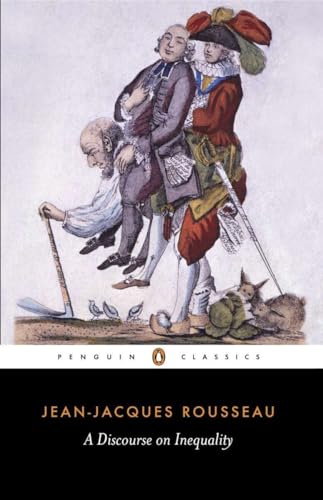A Discourse on Inequality (Penguin Classics)
Jean-Jacques Rousseau; Maurice Cranston
BOOK REVIEW

In the aftermath of revolutions and the clashing ideologies of power and governance, A Discourse on Inequality emerges as a clarion call for introspection. Jean-Jacques Rousseau, a titan of political philosophy, dissects the very fabric of society, unraveling the threads of wealth, power, and human nature. His eloquence and raw insight provide a mirror to our own world, challenging us to confront the ugly truths that perpetuate inequality in our modern landscape.
Rousseau's work transcends the pages of history. Written in the 18th century during a time of burgeoning capitalism and social stratification, his treatise resonates with contemporary issues of injustice that plague our societies today. He bravely posits that the establishment of private property was the original sin that gave birth to inequality, suggesting that our very foundations of civilization are riddled with the seeds of discord and anguish. 📉 What if the pursuit of material wealth is, in fact, a path to our collective demise?
Through his piercing lens, Rousseau invites you to explore the contrast between the noble savage and the corrupted citizen. His exploration ignites a powerful emotional response-fear of societal decay and apprehension about our roles within it. Have we allowed ambition and greed to distort our shared humanity? These questions claw at your conscience, demanding reflection and action. 🕊 The visceral nature of Rousseau's arguments compels you to ponder your own values in an age dominated by consumerism and individualism.
As you dive into the depths of Rousseau's arguments, you may encounter the polarized reactions from readers of his time and those in the present day. Some hail his philosophy as revolutionary, arguing that he laid the groundwork for later democratic ideologies and social contracts. Others criticize him for romanticizing a past that may never have existed, dubbing his ideas as unrealistic and impractical. This mix of admiration and skepticism adds layers to your understanding of the discourse, urging you to grapple with the complexities and implications of his propositions.
Rousseau's profound influence on thinkers such as Karl Marx and John Stuart Mill cannot be overstated. His thoughts on inequality have become foundational in the fields of sociology, politics, and ethics, resonating through the ages like a powerful echo. 🌊 His clarion call to rethink the relationship between man and society has inspired countless movements toward social justice and equity. Yet, in a world riddled with systemic flaws, could Rousseau's insights serve as a beacon for the reformers of today?
Despite the passage of time, the haunting specter of inequality lingers, challenging us to confront the myriad ways in which social structures perpetuate division and strife. As you engage with A Discourse on Inequality, feel the urgency to act. This is not merely an academic exercise but a palpable challenge to our collective conscience. The time is ripe for critical thought and transformative action.
Rousseau's words strike a chord that resonates deeply within those who dare to listen. Are you prepared to embrace the discomfort of this discourse? This book is not just a reflection on the past; it is a provocative invitation to reshape our present and future. Engage with it, be unsettled by it, and, above all, be moved to honor the shared humanity that transcends societal divides. 🌍✨️
📖 A Discourse on Inequality (Penguin Classics)
✍ by Jean-Jacques Rousseau; Maurice Cranston
🧾 192 pages
1985
#discourse #inequality #penguin #classics #jean #jacques #rousseau #JeanJacquesRousseau #maurice #cranston #MauriceCranston